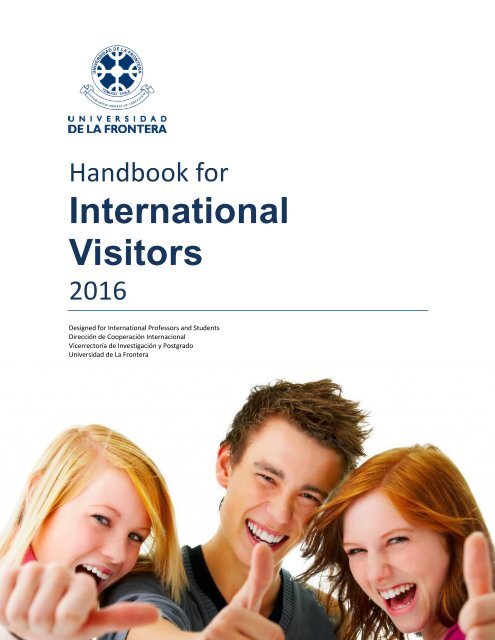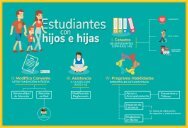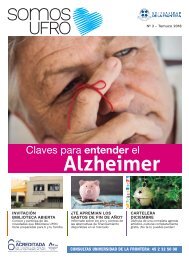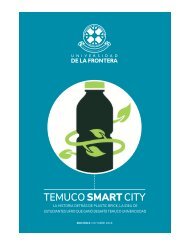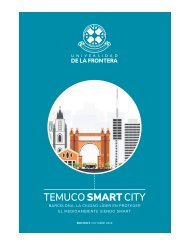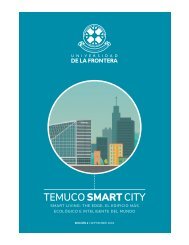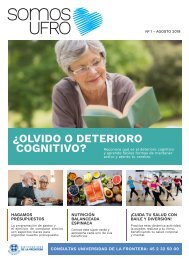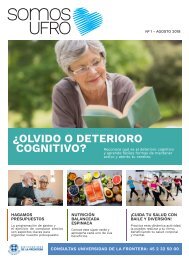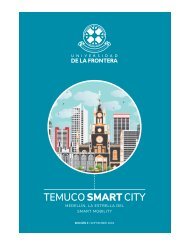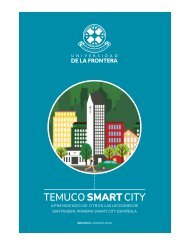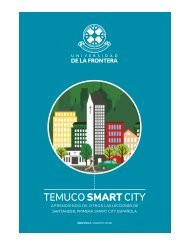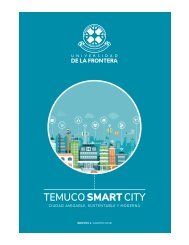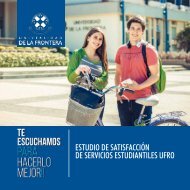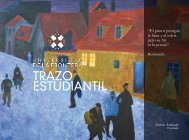HandBook for International Visitors English Version
You also want an ePaper? Increase the reach of your titles
YUMPU automatically turns print PDFs into web optimized ePapers that Google loves.
Handbook <strong>for</strong><br />
<strong>International</strong><br />
<strong>Visitors</strong><br />
2016<br />
Designed <strong>for</strong> <strong>International</strong> Professors and Students<br />
Dirección de Cooperación Internacional<br />
Vicerrectoría de Investigación y Postgrado<br />
Universidad de La Frontera<br />
1
Welcome<br />
The following manual was prepared in order to help international<br />
students and professors during their stay in our beautiful city. In this<br />
edition you will find in<strong>for</strong>mation, that will help you planning your<br />
visit in our University including the way to arrive to Temuco and<br />
moving around the city, the change <strong>for</strong> money, the weather, the<br />
time zone, national days and some activities that you can do in our<br />
university. We are really happy to host you in our institution and we<br />
want you to feel com<strong>for</strong>table and that you’ll enjoy your stay in<br />
Temuco.<br />
Dra. Martha T. Ramírez Valdivia<br />
Directora de Dirección de Cooperación Internacional<br />
Universidad de La Frontera<br />
martha.ramírez@ufrontera.cl<br />
Vicerrectoría de Investigación y Postgrado<br />
+56 45 2325059 / 5058<br />
cooperacion.ufro.cl<br />
Universidad de La Frontera<br />
Avenida Francisco Salazar 01145<br />
Temuco, Chile Casilla 54D<br />
2
Table of contents<br />
Which kind of documents do I need in order to join the exchange program in the Universidad de La Frontera? 4<br />
Arriving in Arturo Merino Benítez airport in Santiago 5<br />
How do I arrive from Santiago to Temuco? 5<br />
How do I move from Temuco’s Airport to the city centre? 6<br />
How do I arrive from the bus station to the city? 6<br />
Where do I can change my money into Chilean pesos? 8<br />
What is the weather like in Temuco? 9<br />
What is the official time in Chile? 9<br />
Which are the days off in Temuco? 9<br />
Where I can live in Temuco? 10<br />
What do I need do when I arrive to the UFRO? 10<br />
What other activities can I do in the UFRO? 12<br />
Interesting Links 13<br />
Contacts 13<br />
3
Which kind of documents do I need in order to join the<br />
exchange program in the Universidad de La Frontera?<br />
A letter of acceptance written from you director (<strong>for</strong> exchange<br />
students)<br />
You will need a letter signed by your director of study where he/she will express his/her support <strong>for</strong> your exchange.<br />
----------------------------------------------------------------------------------------------------------------------------------------------------------------<br />
----------------------------------------------------------------------------------------------------------------------------------------------------------------<br />
1. Passport<br />
In order to enter the country you will need a valid passport released by your home country and which will be valid<br />
<strong>for</strong> all the period of your stay in Chile. This document is required to obtain a temporary residence visa or a studying<br />
visa.<br />
2. Studying visa of Chilean Government<br />
a. Exchange Student<br />
In order to ask <strong>for</strong> this kind of document you must visit the website of the Ministry of Foreign Affairs of Chile. Here<br />
you can find all the needed in<strong>for</strong>mation to obtain the temporary residence visa.<br />
http://www.minrel.gob.cl/obtainment-of-a-temporary-residence-visa/minrel/2014-10-08/115920.html<br />
b. Foreign Student<br />
If you are thinking in studying in our country a bachelor, master or doctorate that will last more than one year, you must<br />
obtain a residential studying visa. You can find additional in<strong>for</strong>mation in the following link.<br />
http://www.minrel.gob.cl/obtainment-of-a-student-resident-visa-<strong>for</strong>-<strong>for</strong>eign-born-citizens/minrel/2014-10-<br />
08/115520.html<br />
3. Health insurance<br />
In order to obtain the visa is necessary a health insurance which would cover any accident or illness during your stay.<br />
4. Spanish Knowledge<br />
You will need to have a basic knowledge of Spanish in order to attend classes.<br />
4
Arrival at the Arturo Merino Benitez Airport in Santiago de<br />
Chile<br />
Once you arrive to Arturo Merino Benítez airport in Santiago you will<br />
need to pass an immigration check, where they will ask <strong>for</strong> an<br />
identification document (identity card or passport depending from your<br />
origin country) and your visa, like we explained in page 4.<br />
All the passengers who travel with Australian or Mexican passport must<br />
pay a tax of reciprocity be<strong>for</strong>e going to the international police. You will<br />
find instructions in the airport. Once you have realized this payment,<br />
you can go to the immigration check.<br />
For any doubts regarding this tax please contact the following number<br />
+56 2 26901063<br />
After this, follow the signals till you will arrive to the baggage carousels.<br />
You will find free luggage cars. After this, your luggage must pass <strong>for</strong> the<br />
agricultural inspection (SAG). For any question revise the FAQ in the<br />
following link<br />
http://www.aduana.cl/aduana_eng/site/edic/base/port/inicio.html<br />
If you have some doubts regarding which kind of vegetable and animal origin products you can not introduce to<br />
Chile, please check it out here<br />
http://english.sag.gob.cl/ingreso-o-salida-de-chile<br />
How do I arrive from Santiago to Temuco?<br />
Once you will be out of the airport, you will have two different way to travel to Temuco. The first one is taking a<br />
plane using the national airlines “Sky airline” (http://www.skyairline.cl) or “LAN” (www.lan.cl). This flight cost<br />
around $20.000 and $100.000 pesos chilenos (CLP), depending from the day you travel. Both companies offer oneway<br />
and round-trip tickets. For flying with this companies you must go to the third floor of the airport in the section<br />
of national boarding. We advise to buy the ticket in advance.<br />
The second possibility is to travel by bus. If you choose this you must go to the bus station where you can find<br />
different companies with different prices all between $6.000 and $40.000 CLP (one way) depending on the type of<br />
service and the company. There are bussed to Temuco in lots of time during the day and the night.<br />
If you choose to travel by bus you will find different options to travel from the airport to the bus station. The airport<br />
has (i) shuttle whose tickets cost around $6.200 CLP; (ii) official taxi, whose price is more or less 15.000 CLP; (iii)<br />
buses; these travel every 30 minutes and arrive exactly till the bus station. They take 30 minutes and cost around<br />
5
$1.600 CLP. In Santiago there are companies that offer this service: Turbus y Centropuerto. For more in<strong>for</strong>mation<br />
please visit:<br />
http://www.aeropuertosantiago.cl/english/medios-de-transporte- desde-y-hacia-scl/buses-y-minibuses.html.<br />
We recommend this last option if you can’t spend a lot of money, because the bus leave you in the station where<br />
you will begin your travel to Temuco.<br />
How do I move from Temuco’s<br />
Airport to the city centre?<br />
follow the signs till the luggage carousel.<br />
If you decide to travel by plane you will arrive to La Araucania’s<br />
Airport, which is located 20km south of the city in the district of<br />
Freire, 1.5 km from the Ruta 5 Sur highway. Once in the airport,<br />
After this you will need to take a taxi or a shuttle to the city of Temuco. The travel last 20 minutes and cost around<br />
$6.000 (shuttle) and $20.000 CLP (taxi) depending on the final destination.<br />
How do I arrive from the bus<br />
station to the city?<br />
If you choose to travel by bus, you will arrive to the main Bus station<br />
(Rodoviario) with any of the company (except JAC busses). The main<br />
bus station is located in the north part of the city, where you will find<br />
taxi, taxi colectivos (shared taxi with a defined way) and microbuses of the public transport. Moving by taxi cost<br />
around $6.000 CLP and take 10 minutes to arrive to the city centre. A Colectivo (tax) it costs $500 CLP during the<br />
day and $700 CLP during the night (from 11pm to 6am); the microbus costs $450 CLP.<br />
6
How do I arrive to UFRO?<br />
Public transport links different parts of Temuco using microbuses, taxi and colectivos taxi.<br />
Some lines of the Microbuses take from the city centre (Manuel Rodríguez street with Bulnes street) to the UFRO.<br />
These lines are: 4B (blue and white buses), 5 (red and green, yellow and white buses), 8B (green and white buses)<br />
and 10 (purple and white buses). The tickets costs $450 CLP and $150 CLP <strong>for</strong> students with the national student<br />
card (TNE).<br />
If you choose to use a colectivos taxi, you must pay attention, because there are many different lines and each one<br />
has differents paths. Every line has a specific number sometimes match with a letter. From the city centre (Manuel<br />
Montt street with Bulnes Street) you can take the following lines to arrive to the UFRO: 14, 15, 19, 21, 24, 24a and<br />
25. The cost <strong>for</strong> one trip is of $500 CLP during the day (till 11pm) and of $700 CLP during the night (from 11pm to<br />
6am).<br />
In the following pictures you will find a map of Temuco where are underlined the city centre, the Andrés Bello<br />
Campus of the UFRO (light blue circle), the Cerro Ñielol (red circle) and the main Station, Rodoviario (full red circle).<br />
7
Where can I change my money into Chilean Pesos?<br />
The official currency of Chile is the Peso Chileno (CH$ o CLP). The banknotes have a value of $1.000, $2.000, $5.000,<br />
$10.000 and $20.000 while the coins are worth $5, $10, $50, $100 y $500 (<strong>for</strong> more in<strong>for</strong>mation visit the following link:<br />
http://www.bcentral.cl/billetes-monedas/). The <strong>for</strong>eign money can be exchanged in the banks or in specific places<br />
named casa de cambio. You will not need any additional documents. On the other way you can also use your credit card<br />
to withdraw money from ATMs that are located in banks and also in some fuel stations, shops, pharmacies and<br />
supermarkets.<br />
In Temuco you can find casas de cambio near the Anìbal Pinto square (Plaza de Armas) in the city centre. Some of these<br />
places are:<br />
TUR-CAMB.<br />
Address: Bulnes 667<br />
(+56 )(45) 2270514<br />
FESA<br />
Address: Prat 717<br />
(56)(45) 2276258<br />
CHRISTOPHER<br />
Address: Manuel Bulnes 667, Of. 113<br />
(56)(45) 2988568<br />
COMEX<br />
Address: Arturo Prat 425, Local 2<br />
(56)(45) 2641815<br />
CAMBIO GLOBAL<br />
Address: Bulnes 655, Of 1<br />
(56)(45) 2213699<br />
AFEX<br />
Address: Antonio Varas 914<br />
(56)(45) 2231075<br />
In<strong>for</strong>mation about some banks in Temuco<br />
The time of attention in the banks are from Monday to Friday from 9am to 2pm. Banks do not open during the<br />
afternoon. Generally the “Casas de Cambio” (Money Exchange) and shops open from Monday to Friday from 10am<br />
to 8pm and Saturday from 10am to 2pm. The mall and some department stores open from Monday to Sunday.<br />
Notice that:<br />
Do not change your money in the street. You will find ATMs in the most of the places and they are easy -access. You<br />
can use your credit card also to pay in most of the services and shops.<br />
8
What is the weather like in Temuco?<br />
Temuco has well defined season, even if it rains a lot also in summer. Sunny days are the majority during the<br />
summer with a maximum of 27º C and a minimum of 12ºC.<br />
During winter the maximum is 12 ºC and the minimum 2 ºC (occasionally will freeze).<br />
It can rain in every moment of the year; the annual average of rainfall is of 2000mm, with the major distribution<br />
between March and November.<br />
What is the official time in Chile?<br />
The time zone in GTM-3. This could vary in winter and summer<br />
Which are the Holidays in Chile?<br />
You can see the Holydays in the scheme below. This in<strong>for</strong>mation is really useful if you are planning your trip and<br />
activities during this year (2016)<br />
Día<br />
Sundays<br />
Friday, January 1st<br />
Friday, March 25th<br />
Saturday March 26th<br />
Sunday, May 1st<br />
Saturday, May 21st<br />
Monday, June 27th<br />
Saturday, July 16th<br />
Monday, August 15th<br />
Sunday, September 18th<br />
Monday, September 19th<br />
Monday, October 10th<br />
Monday, October 31st<br />
Tuesday, November 1st<br />
Thursday, December 8th<br />
Sunday, December 25th<br />
Festividad<br />
Sunday<br />
New Year<br />
Holy Friday<br />
Holy saturday<br />
National Labour Day<br />
Day of the Naval Glory<br />
Saint Peter and Paul<br />
Day of the Virgin of Carmen<br />
Assumption of the Virgin<br />
National Independence<br />
Day of the Glory of the Army<br />
Columbus Day<br />
Day of the Evangelical and Protestant churches<br />
Day of all the saints<br />
Immaculate Conception<br />
Christmas Day<br />
Important: some holidays can be move to the closest Monday or Friday in order to create a larger weekend.<br />
9
Where can I live in Temuco?<br />
Each student must find a place to live in Temuco by himself/herself.<br />
The <strong>International</strong> and the Mobility Office (undergraduates) can help giving in<strong>for</strong>mation, numbers and some advice to<br />
that people, who need find a place to live during their stay in Temuco. <strong>Visitors</strong> have the following options:<br />
- Hotels<br />
- Departments<br />
- Family House (Pension)<br />
- Shared Apartments<br />
It is really important <strong>for</strong> us that all the people from other countries live in a safe and nice place in order to fulfill his/her<br />
expectation. This office only provides in<strong>for</strong>mation, every person is responsible to find a place to live according to his/her<br />
necessity. We also have a list of places provided by university professors.<br />
To know more about where to live, please write to movilest@ufrontera.cl (undergraduate) or to dircpi@ufronteral.cl<br />
We will be really glad to help you.<br />
What do I need do when I arrive to the UFRO?<br />
When you arrive to the UFRO as a graduate or undergraduate student, you must do some procedures in order to make<br />
more easy and com<strong>for</strong>table your stay.<br />
Contacts <strong>for</strong> Bachelor’s students:<br />
movilidad.ufro.cl<br />
movilest@ufrontera.cl<br />
Undergraduate Mobility Office: Ms. Antonia Espinoza<br />
antonia.espinoza@ufrontera.cl<br />
Contacts <strong>for</strong> Graduates students.<br />
http://postgrado.ufro.cl<br />
postgrado@ufrontera.cl<br />
Social assistant <strong>for</strong> Graduate students: Ms. Bárbara Raposo<br />
barbara.raposo@ufrontera.cl<br />
Activate your personal number / Graduate Student:<br />
If you are a Graduate Student, you must enroll in the Universidad de La Frontera.<br />
1. Put yourself in contact with the admission office <strong>for</strong> the graduates studies and your Program director.<br />
2. Ask <strong>for</strong> a meeting with the social worker in order to activate your inscription and take the courses <strong>for</strong> the first<br />
semester.<br />
3. Ask <strong>for</strong> your inscription certificate and number.<br />
10
4. Go to pay your first fee or the totality.<br />
Activate your Intranet page and your email address of the<br />
university<br />
The Intranet and the email address are the way you will receive the most important communication from the university.<br />
In order to activate them follow these instructions:<br />
1. Go to: www.ufro.cl<br />
2. Above in the right part of the page you will find the Intranet Icon; Click on it.<br />
3. Fill the space of the RUT (with your identification number) and click on “crear clave”. After that fill the <strong>for</strong>m that will<br />
appear.<br />
4. In your personal page click on “alumno" and after on "correo ufromail".<br />
5. Write your password and wait 24 hours till the email will be activated.<br />
Activate your page in the Plat<strong>for</strong>m of the University (Virtual<br />
Campus)<br />
Virtual Campus is a plat<strong>for</strong>m, which contains useful materials, activities and works in order to pass your exams.<br />
1. Once you have accessed to "ufromail", in the first page you will find a message that contain your password to the<br />
Virtual Campus.<br />
2. In order to access the Virtual Campus, visit the page http://campusvirtual.ufro.cl<br />
3. Fill the gap with your identification number instead of the RUT.<br />
4. Write the password, you received by e-mail.<br />
5. The activation of the course is automatic, you only need to be enrolled in the course.<br />
Obtain the Intelligence University Card (card <strong>for</strong> the Library)<br />
The card <strong>for</strong> the library is a blue card with your in<strong>for</strong>mation. It is really useful <strong>for</strong> ask <strong>for</strong> books in the library and <strong>for</strong><br />
students that don’t have a personal computer it is also useful to access the Computeca (a room with computer)<br />
1. First of all, you must go to the office of the Dirección de Desarrollo Estudiantil, <strong>for</strong> undergraduate students.<br />
2. Office Hours 9am to 1pm and 2.30pm to 4.30pm.<br />
3. If you need some urgent books, you can send an email to the Asistente Social de Postgrado, and ask <strong>for</strong> a<br />
meeting. This person will give you a provisory card to enter the library and ask <strong>for</strong> books.<br />
4. When you will receive the card from the Asistente Social you will need activate it in the library.<br />
Obtain the National student card (TNE)<br />
With the TNE you can pay a lower price in the public transport (Buses only around Temuco).<br />
1. Ask <strong>for</strong> a meeting with the social worker and pay about $ 3.000 CLP depending from the year.<br />
2. The social worker will indicate you where to take a picture <strong>for</strong> your TNE.<br />
3. This card can be used all the week, only when you are travelling <strong>for</strong> topics of study.<br />
11
*RUT: Must be obtained at the Civil Registrar´s Office located al Temuco downtown.<br />
Register <strong>for</strong> the courses<br />
This procedure is necessary starting from the second semester (during the first one the procedure is automatic).<br />
1. Go to Intranet (http://intranet.ufro.cl) and fill the gaps with your personal in<strong>for</strong>mation.<br />
2. Click on "Asignaturas" in the left part.<br />
3. Select the courses you want register in.<br />
4. Click on "Grabar" (save) and complete the gaps with your personal number (RUT) and your password.<br />
5. If you made it in the right way you will receive an email with a message that says that you successfully enrolled your<br />
courses. If you have any problem, please go to have a talk with the secretary or the director of the study program in<br />
which you are enrolled.<br />
Which other activities can I do in the UFRO?<br />
Sports<br />
UFRO has a lot of different sports in which you can join in, such as:<br />
American football, athletics, basketball, circus, football, football, handball, hockey, judo, karate, table tennis (ping-pong),<br />
rugby, taekwondo, tennis, climbing, swimming and weightlifting.<br />
To obtain more in<strong>for</strong>mation about the schedule please check the following link www.deportes.ufro.cl or ask by email to<br />
deportes@ufrontera.cl<br />
Students Organization<br />
There are different students organization in the university in which you can join in, including: animal consciousness,<br />
anime, Chilean culture, education, environment and sustainability, folk music, journalism, Mapuche culture, film,<br />
orchestra, photography, religion, Shogi, role playing, social assistance and technology.<br />
To obtain more in<strong>for</strong>mation about the students organizations, please revise the following website: www.dde.ufro.cl.<br />
12
Interesting links:<br />
Vicerrectoría de Investigación y Postgrado (VRIP)<br />
vrip.ufro.cl<br />
DDE (Dirección de Desarrollo Estudiantil)<br />
dde.ufro.cl<br />
Admisión de Pregrado<br />
admission.ufro.cl<br />
Admisión de Postgrado<br />
postgrado.ufro.cl<br />
Calendario de Pregrado UFRO 2016<br />
ufro.cl<br />
Calendario de Postgrado UFRO 2016<br />
postgrado.ufro.cl<br />
Biblioteca<br />
www.bib.ufro.cl<br />
Contacts:<br />
Dirección de Cooperación Internacional<br />
Dirección: Avenida Francisco Salazar 01145, Temuco, Chile. Casilla 54-D.<br />
dircpi@ufrontera.cl<br />
+56 45 2325059<br />
Directora de Cooperación Internacional<br />
Dra. Martha T. Ramírez Valdivia<br />
martha.ramirez@ufrontera.cl<br />
+56 45 2325058<br />
Secretaria Dirección de Cooperación Internacional<br />
Ms. Graciela Retamal Rubio<br />
graciela.retamal@ufrontera.cl<br />
+56 45 2325059<br />
Oficina de Movilidad Estudiantil<br />
Ms. Antonia Espinoza<br />
antonia.espinoza@ufrontera.cl<br />
+56 45 2 325577<br />
13


